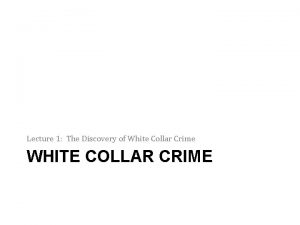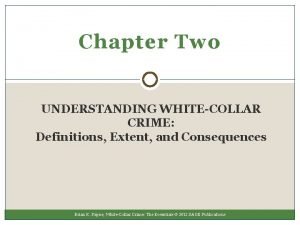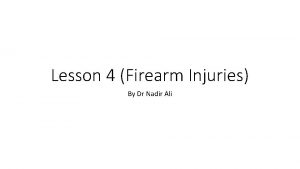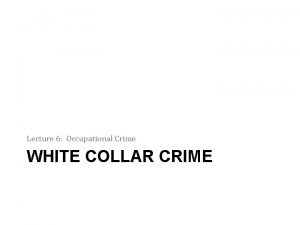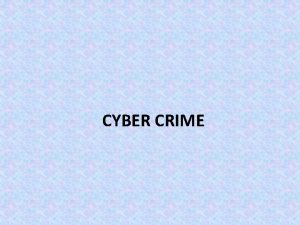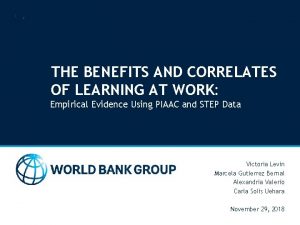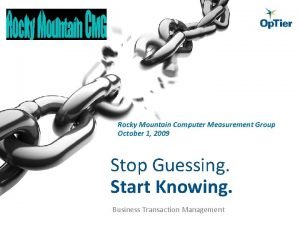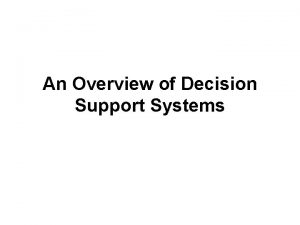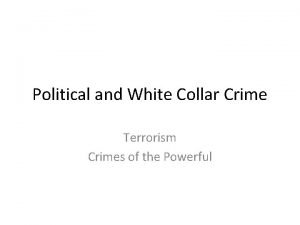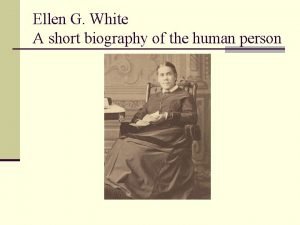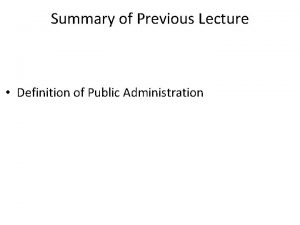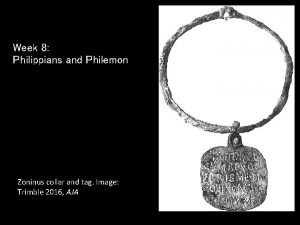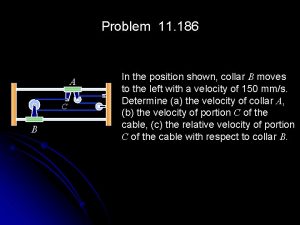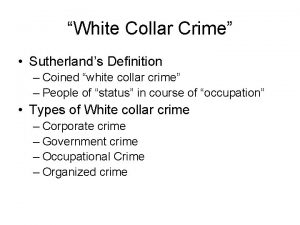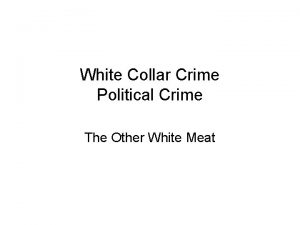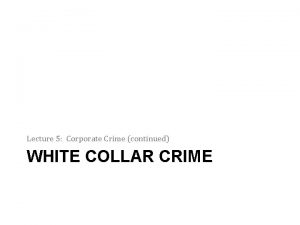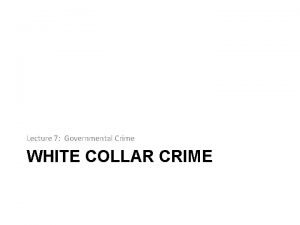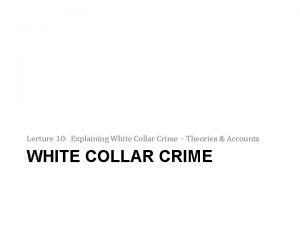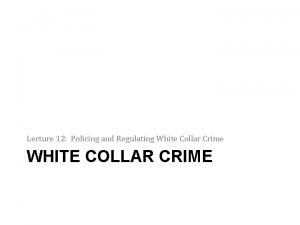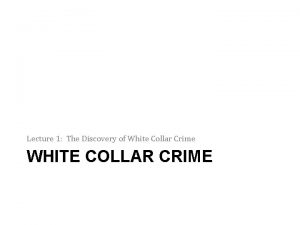Lecture 6 Occupational Crime WHITE COLLAR CRIME Definition


















- Slides: 18

Lecture 6: Occupational Crime WHITE COLLAR CRIME

Definition The term “occupational crime” is typically applied to acts in which financial gain or status is sought (or their loss prevented) in the context of performing one’s job.

Retail Crime • Misrepresenting an inferior product as a more expensive one. • Adulteration of products (e. g. , tap water sold as spring water). • Short-weighting (e. g. , providing less meat than the customer pays for). • Bait-and-switch – consumers lured by sale prices for items that are not available and then are sold higher-priced items. • Collecting taxes for non-taxable items.

Service Fraud • Making/Advising unnecessary repairs • Overcharging

Medical Crime • Can be fraud-based (e. g. , billing for unnecessary tests) or violent in nature (e. g. , performing unnecessary surgery)

Medical Crime: A Case Study May 19, 2007 Press Release from the California Department of Insurance: Three Doctors Arrested in Unity Outpatient Surgery Center Scam for Performing Unnecessary Surgeries and Fraudulent Insurance Billing The California Department of Insurance and the Orange County District Attorney's Office have arrested three doctors in the largest medical fraud prosecution in the nation. The three defendants are Dr. Michael Cheeluen Chan, 61, Cerritos, an obstetrician-gynecologist, Dr. William Wilson Hampton, Jr. , 51, Seal Beach, general surgeon, and Dr. Mario Z. Rosenberg, 60, Beverly Hills, a gastroenterologist. The doctors charged in this case are accused of participating in medical insurance fraud for performing medical procedures on healthy people with the knowledge that the patients were being recruited. Chan, Hampton, and Rosenberg are accused of performing 1, 037 procedures, resulting in insurance billings for the facilities fees alone that exceeded $30 million. Unity received over $5. 1 million in payment as a result of the surgeries performed by the doctors.

Many of the surgeries were performed on Saturdays and Sundays by the doctors. Often they operated on members of the same household on the same day. Each doctor has been charged with 47 felony counts, including one count of conspiracy to commit insurance fraud, eight counts of paying cappers, 19 counts of insurance fraud, and 19 counts for using cappers to recruit patients from the victim insurance companies.

Legal Crime • Lawyers engaging in criminal conduct in the course of discharging their professional duties. o Can be fraud-based (e. g. , theft, overbilling) or based on collusion (aiding and abetting the crimes of clients). • Lawyers are most likely to be punished for misappropriation of client funds and related activities.

Legal Crime as Fraud: A Case Study When Bellevue attorney Diane Van. Derbeek was facing a two-year suspension from the state bar association in 2002 for over billing her clients, she appealed the decision to the state Supreme Court. Instead of overturning her suspension, the state's high court disbarred Van. Derbeek for charging extravagant fees for minuscule tasks to vulnerable clients — including a woman in a child-custody fight and another with an abusive husband. From 1992 to 2000, Van. Derbeek padded her bills for financial gain, such as charging hundreds of dollars for minor clerical work, or charging clients for time spent trying to collect money from them, according to the court's opinion, written by Justice Bobbe Bridge. She "intentionally billed excessive and unreasonable fees for simple form pleadings, one-page letters, and notices of intent to withdraw. . . , " Bridge wrote. “ Van. Derbeek failed to end her unethical billing practices even after the 1996 settlement. "

In 1996, Van. Derbeek settled a lawsuit with 28 former clients over excessive billing for $200, 000. She promised she would change her billing software, according to the court record. But the software wasn't changed until 2000. A Washington State Bar Association disciplinary board had recommended the twoyear suspension in 2002, but Van. Derbeek appealed and had been allowed to continue practicing law, said Kathy Henning, a bar association spokeswoman. Van. Derbeek graduated from law school in 1981 and ran a successful practice while her husband, John, handled the bills, according to the court's opinion. John Van. Derbeek created an atmosphere in which clients were afraid to question the billing, and Diane Van. Derbeek did nothing to change her methods. To a woman with an abusive husband, Diane Van. Derbeek charged $350 for writing two simple documents, including a 1 -½-page letter. To a woman facing a child-custody fight, Van. Derbeek charged for phone conversations that apparently did not take place, the court said.

The court voted 6 -3 in favor of disbarment. Dissenting were Justices Barbara Madsen, Charles Johnson and Faith Ireland. In a dissenting opinion, Ireland said the majority opinion discounted some mitigating factors that made Van. Derbeek more sympathetic, such as the large settlement she paid to her former clients in 1996. "A settlement is by its nature a voluntary action and was not compelled, " Ireland wrote.

Legal Crime as Collusion: Food for Thought “Look who’s Left Standing, ” Washington Post, August 31, 2006: Four years after regulators launched a task force to stamp out business corruption, numerous chief executives are on their way to prison, two of the nation's biggest accounting firms are defunct or on probation, and investment banks have shelled out billions of dollars in settlements. But lawyers serving fraud-ridden companies have emerged relatively unscathed. Unlike the accounting profession, forced by the Sarbanes-Oxley Act in 2002 to submit to independent oversight, lawyers have generally ducked proposals that would have forced them to blow the whistle to outsiders.

On an individual level, law firms that dispensed bad advice or failed to act on red flags mostly have avoided prosecution, in contrast to their brethren in the accounting industry. Arthur Andersen LLP met its demise after a 2002 conviction, later overturned, of obstructing justice in the Enron Corp. case. Rival KPMG LLP operates under a form of probation for selling abusive tax shelters. Nor have securities regulators pursued sweeping civil cases against groups of law firms, seeking to determine if they may have performed shoddy work or ignored fraud under their noses. Compare that with a group of leading investment banks, including Merrill Lynch & Co. and J. P. Morgan Chase, that handed over $1. 4 billion in 2002 to settle accusations that their analysts produced overly optimistic research reports to help win business for the banks. Several banks later ponied up billions of dollars more to resolve shareholder accusations that they had helped companies disguise financial problems. "There's every reason why lawyers acting as gatekeepers ought to be held responsible for failures to carry out clear legal mandates, " said Harvey J. Goldschmid, a former member of the Securities and Exchange Commission who now teaches at Columbia University School of Law.

Lawyers, of course, enjoy broad privileges that prevent them from sharing client confidences. But courts have held that exceptions can be made in cases where fraud or other crimes have taken place. And the legal privilege would give little cover to attorneys if they broke the law by actively covering up accounting schemes, funneling money to themselves and their bosses or tampering with documents. To hear many lawyers tell it, the regulatory environment has grown far more harsh in recent years. Indeed, the former general counsel of Computer Associates International Inc. pleaded guilty in 2004 to conspiracy and obstruction of justice in part for misleading investigators, and the former top lawyer at Rite Aid Corp. was convicted by a jury in 2003 for helping his boss backdate compensation documents. Onetime lawyers at General Re Corp. and Hollinger International Inc. are awaiting trial on charges that they failed to blow the whistle on problems that came to their attention. "The trend line evident in the last 12 months is that both SEC regulatory sanctions and criminal prosecution of inside counsel are increasing sharply, " John K. Villa, a defense lawyer at Washington's Williams & Connolly LLP, wrote in a recent trade journal article. Yet compared with the treatment of accountants, investment bankers and corporate leaders, very few lawyers have been sanctioned, and they have been among the last to be called to account.

ABA Model Rules of Prof’l Conduct Rule 5. 3 Responsibilities Regarding Nonlawyer Assistants With respect to a nonlawyer employed or retained by or associated with a lawyer: (a) a partner, and a lawyer who individually or together with other lawyers possesses comparable managerial authority in a law firm shall make reasonable efforts to ensure that the firm has in effect measures giving reasonable assurance that the person's conduct is compatible with the professional obligations of the lawyer; (b) a lawyer having direct supervisory authority over the nonlawyer shall make reasonable efforts to ensure that the person's conduct is compatible with the professional obligations of the lawyer; and

(c) a lawyer shall be responsible for conduct of such a person that would be a violation of the Rules of Professional Conduct if engaged in by a lawyer if: (1) the lawyer orders or, with the knowledge of the specific conduct, ratifies the conduct involved; or (2) the lawyer is a partner or has comparable managerial authority in the law firm in which the person is employed, or has direct supervisory authority over the person, and knows of the conduct at a time when its consequences can be avoided or mitigated but fails to take reasonable remedial action.

Academic Crime Types of academic crime include: • Plagiarism • Misuse of/embezzlement of university funds • Forgery or fraudulent claims about credentials • Gross negligence in the fulfillment of teaching responsibilities • Student white collar crime

Academic Crime: A Case Study Wal-Mart Heir Returns Degree Amid Cheating Claims, Reuters, Oct. 20, 2005: Wal-Mart heiress Elizabeth Paige Laurie has surrendered her college degree following allegations that she cheated her way through the school. The University of Southern California said in a statement that Laurie, 23, "voluntarily has surrendered her degree and returned her diploma to the university. She is not a graduate of USC. " Laurie's roommate, Elena Martinez, told a television show last year that she was paid $20, 000 to write term papers and complete other assignments for the granddaughter of Wal-Mart co-founder Bud Walton. Wal-Mart is the world's biggest retailer. The family could not be reached for comment. Following the allegations, the University of Missouri renamed its basketball arena, which had been paid for in part by a $425 million donation from the Lauries and was to have been called "Paige Sports Arena. "
 White collar crime meaning
White collar crime meaning White collar crime adalah
White collar crime adalah White collar definition
White collar definition Tail wag phenomenon
Tail wag phenomenon Occupational crime definition
Occupational crime definition State authority occupational crime
State authority occupational crime Kejahatan kerah biru (blue collar crime)
Kejahatan kerah biru (blue collar crime) White and blue collar worker
White and blue collar worker White collar workers examples
White collar workers examples Gdss
Gdss Principles of information systems
Principles of information systems Occupational crime in engineering ethics ppt
Occupational crime in engineering ethics ppt 01:640:244 lecture notes - lecture 15: plat, idah, farad
01:640:244 lecture notes - lecture 15: plat, idah, farad White sheep white sheep on a blue hill meaning
White sheep white sheep on a blue hill meaning Ellen g. white henry nichols white
Ellen g. white henry nichols white Definition of public administration
Definition of public administration Zoninus collar
Zoninus collar Die cavity tablet
Die cavity tablet In the position shown collar b moves to the left
In the position shown collar b moves to the left

